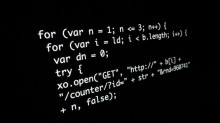Ubuntu 17.10 Temporarily Pulled Due To A BIOS Corrupting Problem
Canonical has temporarily pulled the download links for Ubuntu 17.10 "Artful Aardvark" from the Ubuntu website due to ongoing reports of some laptops finding their BIOS corrupted after installing this latest Ubuntu release. The issue is appearing most frequently with Lenovo laptops but there are also reports of issues with other laptop vendors as well.







































































